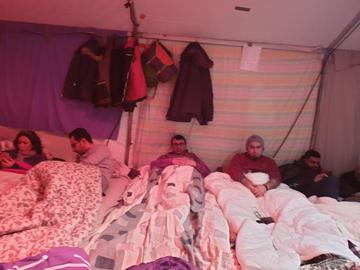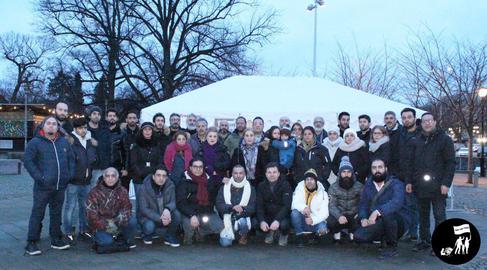A group of Iranian asylum seekers, including women and children, are entering their sixth day of a sit-in and hunger strike in Gothenburg, Sweden, demanding fairer treatment when applying for asylum status in the country.
Many of the protesters’ applications have taken years to receive an answer, and obtaining asylum status is steadily becoming more difficult, in particular for Iranians.
Swedish Authorities And their Feeble Excuses
The protesters, who began their sit-in on February 14, believe the Swedish government systematically discriminates against Iranians, and have provided feeble excuses as to why their applications are being refused.
“We want the Swedish government to change its policies toward Iranians," says Farnaz, a protester in Gothenburg. “We are told that we must prove that we are Christian. In the rejection letters they write, ‘We have not been convinced that you are a Christian,’ they say to me, or, ‘We believe that you are a Christian, but we cannot prove this to be the case.’ Every case is rejected based on a different excuse.”
According to Farnaz, people applying for asylum on political grounds have found their situation the most challenging. When applying for asylum, applicants must meet a list of strict criteria in order to gain legal status and permission to remain in the country. Iranians who have changed their religion must prove they have done so and should their lives be at risk, this claim must also be substantiated.
“Most asylum seekers are rejected for this reason.” Farnaz says. “They tell us that our lives in Iran have not been proven to be in danger. One applicant’s father and brother were executed in Iran, but they advised him that the Iranian government did not do anything to him directly, and so he is not considered a refugee."
Fleeing Persecution in Iran to Face Persecution In Sweden
Iranians now not only face persecution at home in Iran but also in the place they seek refuge.
Should their application be denied, asylum seekers have the right of appeal and to have their cases examined in court to determine a final decision. However, many Iranian asylum seekers are not provided with adequate legal representation.
Another sit-in protester I spoke to, Sarah, applied for asylum status after she converted to Christianity from Islam in Iran and now faces the death penalty. Sarah applied for asylum status with a legal visa, unaware of the challenges she would face.
"The first question the authorities asked me was why, if I already had a legal visa, was I fleeing Iran? The second question was why I converted to Christianity when I knew the penalty would be execution."
She says the lawyer assigned to her case did not defend her properly. In the interview with Swedish immigration authorities, the questions posed to her were illegal and biased.
“The interviewer was Syrian and Muslim. He asked me a question my second lawyer advised was illegal. He said, ‘You know that the punishment for conversion is death. Why do you not keep believing in Allah?’ Many lawyers are not knowledgeable and are on the side of the system."
An Impossible Process, Rife with Discrimination Against Iranians
Like the other asylum seekers who have gone on strike, Sarah believes that the Swedish government responds systematically with a “no” to Iranians: “The explanation for negative answers is the same. This is blatant racial discrimination against Iranians. Asylum conditions are difficult. We have to wait months for an interview and years for a court date. Everyone is under pressure. We have no prospects for the future.”
Explaining the legal review process, Farnaz says: “After the first rejection, applicants have one week to appeal. My lawyer says that the appeals are merely an administrative protocol, and the Court of Appeals’ most likely decision will be to reject the application for a second time. You have to wait for 12 to 18 months and in some cases up to 24 months for another court date. My friend’s appeal has been scheduled for 18 months, but it has been 23 months now and still no word from the Swedish courts. My lawyer told me that sometimes it could take up to 30 months. It is impossible to get a positive result. After this appeal, the applicant will have a non-resident status and be ordered to leave Sweden within one month.”
Many Iranians whose applications are rejected flee to the United Kingdom and other countries, but some are forced to remain in Sweden illegally. Among the current protesters is an Iranian family who, according to Farnaz, has received an order to leave the country: "The immigration service told them they can remain in Sweden illegally. Their documents have been revoked, they have no work permit, and, unless their children are under 18, they will have no access to education and no insurance. They have lost all of their asylum rights.”
Another demonstrator, whose case has been repeatedly rejected, has been living in Sweden for 12 years with no citizenship or asylum rights in the country.
Iranian Protesters: “We Have Nothing More to Lose”
At the start of the application process, asylum seekers are given the option to live in a camp or rent a house on their own. Those who are transferred to the camp receive €66 (US$71) and those who choose to rent receive €170 ($184). The amount is €113 ($122) per month for children.
In recent years, European governments have tightened their domestic laws against asylum seekers in response to Brexit and constantly-changing EU laws. In this environment, asylum seekers are in an ever increasingly unstable position with no rights to secure their safety or their future.
The Iranian protesters in Gothenburg today remain steadfast in their determination to raise awareness of their plight and the discrimination of the application process. As Farnaz puts it: "We have nothing more to lose."
Read other articles in Aida Ghajar’s series about asylum seekers and refugees
I Just Want my Refugee Life in Cuba to Come to an End
A Life Lost: Two Decades of Asylum-Seeking in Calais
We Do Everything, I Mean Everything, To Escape From Our Greek Hell
visit the accountability section
In this section of Iran Wire, you can contact the officials and launch your campaign for various problems


























comments